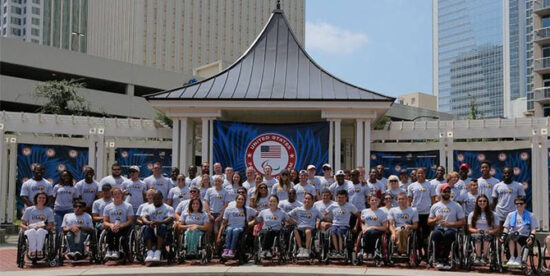
This past year, World Learning was asked to design and administer a 3-week International Visitors Leadership Program (IVLP) on Disabilities Issues for 7 international visitors from Kazakhstan. Their program really highlighted accessibility: to housing, education, rapid transit, training and employment, public facilities, concert halls, museums, voting and more. I knew that some of the visitors were also interested in access to sports. So, in addition to working out logistics that were ADA-compliant in transportation, lodging, and pacing for the needs of 2 wheelchair users, we designed an itinerary that would include the chance to visit the Olympic Training Center headquarters in Colorado Springs — which is also home to the Paralympics — and end with time spent in Jacksonville, Florida, to enjoy their beach wheelchairs. Our colleagues in Denver, Colorado Springs, Jacksonville, and Baltimore outdid themselves, and here’s how.
Their day in Colorado Springs including a visit to the Olympic Training Center, which is used by the U.S. Paralympic team. There, they met with the Program Director and several Paralympic athletes. A private tour of the facilities and lots of opportunity for dialogue was a big part of this successful visit. The group also visited a separate private facility that uses horses for physical therapy. At the Pikes Peak Therapeutic Riding Center in Elbert, Colorado, they learned how the Therapeutic Riding Center strives to enhance the quality of life for people with disabilities or special needs through equine assisted activities and therapies. They teach therapeutic riding, offer equine facilitated psychotherapy, and a special program called Operation Mack – Healing with Horses, which addresses the special rehabilitative needs of military personnel recovering from injuries sustained in the line of duty, such as traumatic brain injuries, amputation or post-traumatic stress disorder (PTSD).
Fran Pilch, our colleague at the Colorado Springs Committee for International Visitors who developed the program in Colorado Springs, had as much fun as the visitors and wrote:
I just loved the day with our Kazakh delegation. The time at the Equestrian Therapeutic Riding Center was just as fascinating to me as to the Kazakhs, who kept wanting to ride, even though I had told the programmers that getting on the horses was not an option. But the afternoon at the Olympic Training Center, where we were personally escorted by two Paralympic athletes was stellar and very inspiring. I loved every moment!
Rebecca Eppler at GlobalJax designed the Jacksonville segment. At the Jacksonville Beach Lifeguard Station, the group talked about the origin of the concept for their innovative beach wheelchair program. They were also encouraged to take a ride in these wheelchairs along the beach. Jacksonville Beach has three wheelchair ramps to access the beach, and special beach wheelchairs with big round tires are available to help wheelchair users be able to access and enjoy a day at the beach. Jacksonville Beach also has accessible showers and restrooms. What a wonderful well to end their three week program after exploring how many public facilities have become accessible since the passage of the landmark Americans with Disabilities Act brought these needs to wider public awareness.
In Baltimore, their program was arranged by Ms. Janine Branch of the World Trade Center Institute. At the University of Maryland Rehabilitation and Orthopaedic Institute, the group explored its facilities and learned about its mission to provide state- of-the-art, comprehensive medical management, educational, and psychosocial support. While there, the visitors also explored the Adaptive Sports Program’s work to maximize participation for individuals with disabilities in adapted recreational and competitive sports.
The Adapted Sports Program maximizes participation for individuals with disabilities in adapted recreational and competitive sports, in order to promote independence, self-confidence, health and overall well-being through structured, individual and team sports. The Adapted Sports Program aims to be the regional leader in providing sports opportunities for individuals with physical disabilities. The program serves as a resource for individuals searching for sports programs in conjunction with our community partners in the area of adapted sports. The visitors learned how the program promotes independence, self-confidence, health and overall well-being through structured, individual and team sports. The group was able to observe the Wheelchair Basketball program and learn more about its mission.
These meetings exemplify the spirit of the IVLP: its inclusiveness and celebration of the human spirit to overcome obstacles that may seem impossible at first, by offering not only a vision but first-hand experiences of a better way forward.
by Marilyn Saks-McMillion, World Learning. Photo courtesy of U.S. Paralympic Team.
